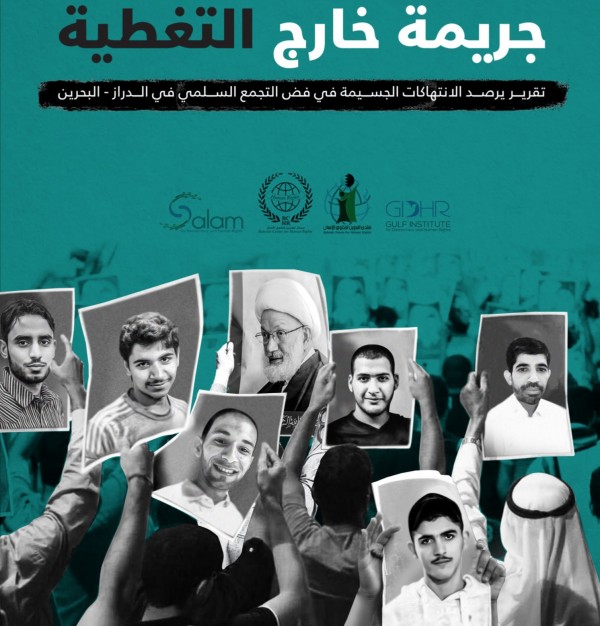 Four Bahraini human rights organizations, the Bahrain Center for Human Rights, the Bahrain Forum for Human Rights, Salam for Democracy and Human Rights, and the Gulf Institute for Democracy and Human Rights, published a report monitoring grave violations in suppressing the Duraz peaceful assembly on May 23, 2017, after the security forces used excessive force to end the gathering, which lasted about a year near the house of the highest religious authority for Shiites in Bahrain, Ayatollah Sheikh Isa Qassim, in a report entitled: A Crime Outside Coverage.
Yahya al-Hadid, head of the Gulf Institute for Democracy and Human Rights, said that suppressing the peaceful gathering in Duraz on May 23, 2017 resulted in killing five protesters, injuring more than 100 people, and arresting 286 residents directly after a specific time of an attack, in which security men used shotguns, sound bombs, and tear gas.
The Bahrain Center for Human Rights (BCHR) said that the security authorities used excessive force indiscriminately and unjustifiably during the attack on the protesters in front of Sheikh Isa Qassim\\\'s house, which resulted in extra-judicial killing of five people, a method that reinforces international statements about Bahrain\\\'s use of force against peaceful protests and sit-ins without regard to any conditions or respect for international conventions and covenants that provide for respecting freedom of peaceful assembly. The culture of impunity and lack of accountability for perpetrators of violations has played a major role in the continuation and high frequency of abuses committed by the security services in Bahrain, including extrajudicial killings, torture and arbitrary arrests, particularly the arrests that took place while attacking the protesters in front of the house of Sheikh Isa Qassim. Those arrests amounted to nearly 300 people, including children, some of them were arrested during raids on their houses, and some of them were later released.
Baqer Darwish, head of the Bahrain Forum for Human Rights, said that the imposition of house arrest on Ayatollah Qassim by the security authorities – without a judicial order or administrative decision – resulted in a violation of his right to receive the necessary and appropriate treatment according to his wishes, and he was transferred to the hospital after a week of the deterioration of his health. Darwish noted that Sheikh Qassim had restricted access to his medications at the beginning of the house arrest, and the house arrest must be ended after he leaves the hospital to ensure that he receives the necessary medical care. Darwish explained that the security forces fired tear gas heavily and illegally near Sheikh Qassim’s house on November 25, 2017, before his relapse, adding that 56 hate-inciting media materials were monitored on social networking sites after the announcement of the deterioration of Sheikh Isa Qassim\\\'s health on November 26, 2017.
For his part, Sayed Yousif al-Muhafdah, Vice President of Salam for Democracy and Human Rights, said that after the verdict was issued against Sheikh Isa Qassim, more than 80 Shiite clerics were interrogated and at least nine of them were convicted because of exercising freedom of assembly and expression. Al-Muhafdah added that citizens are still being prosecuted and subjected to sectarian persecution due to their participation in the Duraz peaceful assembly, instead of opening an independent investigation by an independent UN commission and subjecting those involved in the violations to legal accountability.
The human rights organizations which issued the report called for opening an urgent investigation into the violations caused by the raid on the peaceful assembly, and supported the call of the High Commissioner for Human Rights for opening an independent investigation by an independent committee and holding those involved accountable. The organizations expected that the human rights crisis in Bahrain will escalate, and at the same time they expressed their concern over measures of double standards, lack of accountability, impunity, undermining political activity, pressuring human rights activists, and granting the security authorities comprehensive powers to try and torture citizens solely for exercising their fundamental rights. |